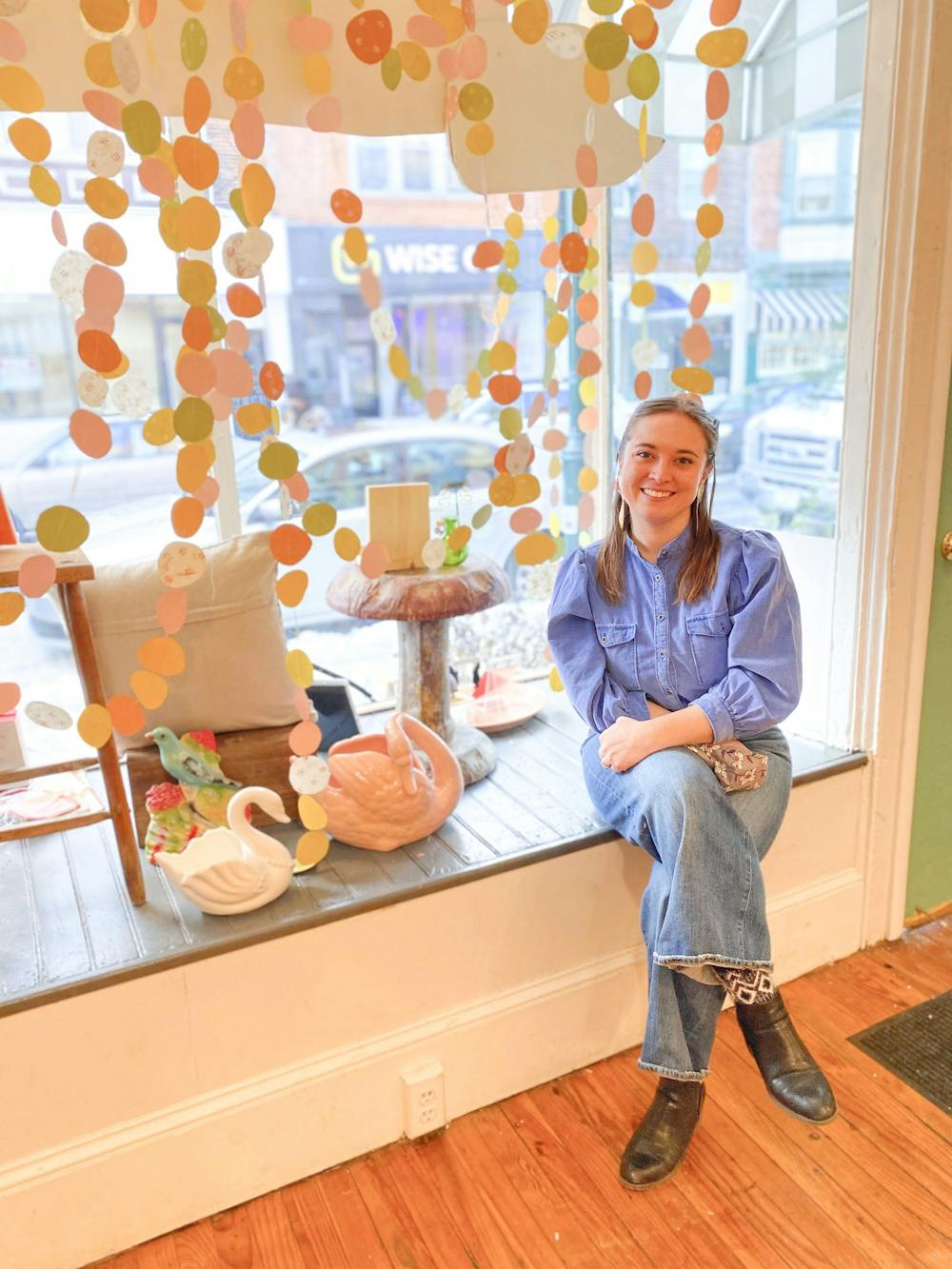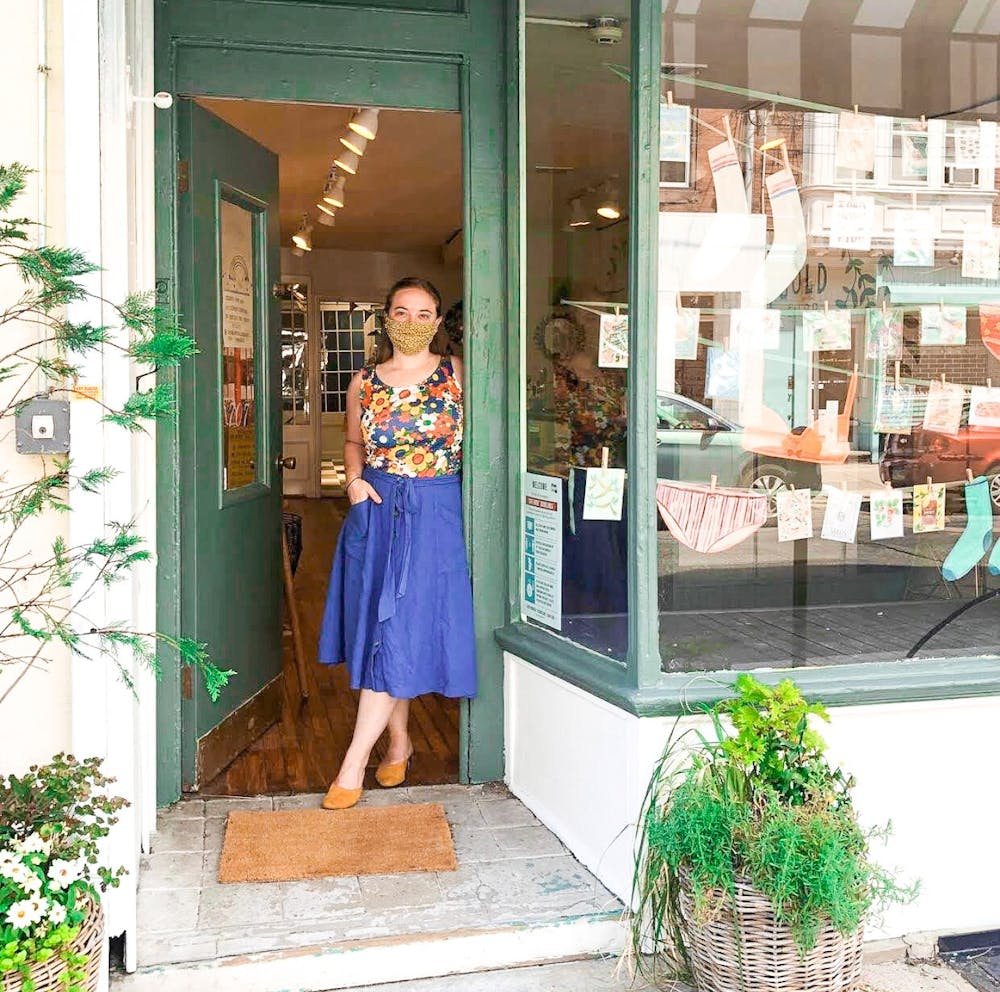In early March 2020, Samantha Bateman finally opened the doors of The Merrygold Shop to the public after months of preparation. Two days later, all nonessential businesses in Philadelphia were ordered to close for two weeks, which then turned into months.
While most small business owners were emotionally and financially devastated in the wake of COVID–19–related closures, Samantha (who cheerfully introduces herself as Sammi to all of her customers) only had two full days of an open shop before she had to lock up indefinitely. She had no regular clientele, a few hundred Instagram followers, and a very minimal website—Sammi was figuring it out all on her own. This made it difficult to pivot to virtual operations and invent ways to pay rent for her empty storefront full of merchandise, which she jokingly describes as the most expensive storage unit she’s ever had.
A year later, Merrygold remains intact, and—even better—it's one of the most beloved small businesses on Fabric Row and in Queen Village, if not the entire city.
Given the immense charm of Sammi’s self–described “tender and weird shop,” it’s not hard to understand why. The spacious yet cozy storefront offers anything an aesthete could ever want, from greeting cards made by local artists, stationery such as notebooks and notepads, printed dishcloths, and locally made jewelry, to fashion accessories, hand–poured candles, framed art, dishes, and even papier–mâché oranges hiding small surprise gifts. It’s hard to describe given its range of offerings, but the best description Sammi can give is that it’s an extension of herself, filled with all of the stuff that she finds appealing.
“I’m calling it a gift shop, which changes all the time … Half of the time when I’m buying, I think that I’d love to have this in my own house. But jewelry and accessories are actually where it started,” Sammi says.
The store is objectively beautiful and well–curated. However, most people can understand that beauty alone can’t keep a business afloat during a pandemic. But, when you take a look behind the scenes, Sammi’s impressive creativity, extensive retail experience, and strong entrepreneurial spirit have been key in ensuring Merrygold’s success.
Even though her background as a fine arts major at the University of Delaware might not sound as useful for running a business as perhaps an MBA, Sammi says, “I’ve always been very entrepreneurial. When cupcakes were a big thing, I made all these tiny cupcakes and I probably sold about 200 of them at 16 years old—silly things like that.” She laughs heartily as she describes her frivolous teenage business pursuits, but it’s clear to see that they weren’t for nothing.
After cupcakes, there was ice cream—more specifically, an ice cream parlor in Dewey, near her hometown of Rehoboth Beach, Del., where she got her first–ever job at the age of 14. She worked there part–time throughout college, and then went on to work at a small boutique called Bella Luna in the same town. Sammi says she “basically learned how to do everything” there, and credits the owner of the shop for being a mentor to her to this day. From there, she became an intern at Anthropologie and quickly rose through the ranks and began to design displays for their stores in the Philly area. After college, she left Anthropologie to become a florist, but later returned. It was through a unique experience in that job (for which she still works full–time) where the idea for what would become Merrygold was conceived.
As a display coordinator, Sammi opened around 12 or 13 stores for the label in various locations—think Palo Alto, Montréal, and Miami. But while opening a store for Anthropologie in Tel Aviv, Israel in March of 2019, things changed for her.
Sammi says, “While we were there [opening up a store], [Tel Aviv] was bombed … It was crazy. I don’t know what the saying is, but pretty much everyone in Israel lives this lifestyle of wanting to make the most of every day because they live in a war zone. That opened my eyes a little bit, because I’d just been grinding at work trying to create this corporate career for myself that wasn’t really getting anywhere. So, being in Tel Aviv and having all of that happen … gave me the push, or at least put me in the right mindset.”
From there, Merrygold slowly but surely came to fruition, and by November 2019, Sammi found her storefront at 707 S. 4th Street. She made a PDF mood board to convince the landlord that she was worthy of renting out the space, placing pictures of the Metropolitan Museum of Art next to those of costume jewelry. “I was just putting in all of these images, saying, ‘This is the world I want to live in.’ And the next day, he said yes … apparently he had gone through 20 candidates and was really picky, and he picked me. This place sat empty for a really long time,” she says.

But places sitting empty on Fabric Row are extremely common occurrences. A historically Jewish hub of commerce in Philadelphia that encompasses the intersections of 4th and Bainbridge streets all the way to 4th and Catherine streets, the blocks–long business corridor peaked in the 1960s. The familial nature of the many textile stores meant that there was no one for these business owners to pass their shops down to, leading to the area’s eventual commercial decline.
That’s all changed in 2021, with the corridor revived due to small shops and restaurants such as Bus Stop Boutique, Walter Pine Studio, Moon + Arrow, Brickbat Books, Fitz and Starts, YOWIE, and more. They coexist among the old school textile shops that remain such as Baldwin Leather & Fabric, B. Wilk Fabrics, Fleishman Fabrics & Supplies, and a few others.
Along with these changes come some downsides, with a lot of the new shops being significantly more upscale than before. This fulfills a niche for the largely upper–middle–class shoppers who frequent and inhabit the area, but alienate large swaths of Philadelphia’s population—especially those who remember Fabric Row as a hub of affordable goods.
Sammi noticed that gap in the market and capitalized on it, renovating the building that became Merrygold on her own with some help from her partner Kenny, who works as a carpenter. In the process, she unearthed beautiful hardwood floors, painted egrets on the walls, and put her creative talents to use before opening, all while continuing to work full–time for Anthropologie.
Fast forward to the present day, and Sammi’s sweet, “tender, and weird” shop is thriving— all without breaking the bank for its customers. Sammi loves her regulars, but notes that her favorite customer is a 13–year–old girl, and that it’s those young customers coming in with pocket change who bring her the most joy when they step into the shop. Those customers also serve as extra motivation to keep her shop affordable and accessible, being mindful of both Fabric Row’s history and her experience of coming from a staunchly middle class family. “I built the store that I wanted to shop at, but that I felt like didn’t quite exist here,” she says.

Photo Courtesy of the Merrygold Shop
Gratitude emanates from Sammi as she speaks about her customers and the experience she wants them to have, even when masked and from a distance. Sammi also gushes about the artisans she buys from and her neighbors on Fabric Row, crediting the many female small business owners on the street with her success and noting their encouragement throughout the pandemic.
Soft indie music plays as our conversation winds to an end and Sammi says, “I just want to create this magical place where you feel cozy inside.”
Even with the fear that came with opening a business during a pandemic, she’s succeeded.

